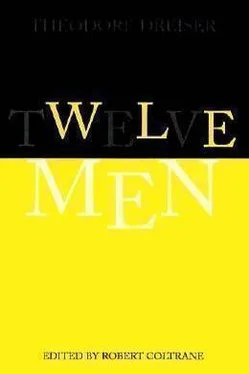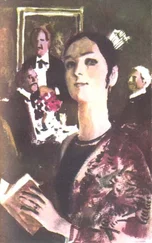I shall never forget his anxiety to get into that mildly interesting body. He worked hard and long on several pictures which should not only be hung on the line but enlist sufficient interest among the artists to gain him a vote of admission. He mentioned it frequently and fixed me with his eyes to see what I thought of him.
"Go ahead," I said; "you have more right to membership perhaps than many another I know. Try hard."
He painted not one, but four, pictures, and sent them all. They were very interesting after their kind. Two were scenes from the great railroad terminal yards; the others, landscapes in mist or rain. Three of these pictures were passed and two of them hung on the line. The third was skyed , but he was admitted to membership.
I was delighted for his sake, for I could see, when he gave me the intelligence, that it was a matter which had keyed up his whole nervous system.
Not long after this we were walking on Broadway, one drizzly autumn evening, on our way to the theater. Life, ambition, and our future were the small subjects under discussion. The street, as usual, was crowded. On every hand blazed the fire signs. The yellow lights were beautifully reflected in the wet sidewalks and gray wet cobblestones glistening with water.
When we reached Greeley Square (at that time a brilliant and almost sputtering spectacle of light and merriment), S― took me by the arm.
"Come over here," he said. "I want you to look at it from here."
He took me to a point where, by the intersection of the lines of the converging streets, one could not only see Greeley Square but a large part of Herald Square, with its then huge theatrical sign of fire and its measure of store lights and lamps of vehicles. It was a kaleidoscopic and inspiring scene. The broad, converging walks were alive with people. A perfect jam of vehicles marked the spot where the horse and cable cars intersected. Overhead was the elevated station, its lights augmented every few minutes by long trains of brightly lighted cars filled with changing metropolitan crowds—crowds like shadows moving in a dream.
"Do you see the quality of that? Look at the blend of the lights and shadows in there under the L."
I looked and gazed in silent admiration.
"See, right here before us—that pool of water there—do you get that? Now, that isn't silver–colored, as it's usually represented. It's a prism. Don't you see the hundred points of light?"
I acknowledged the variety of color, which I had scarcely observed before.
"You may think one would skip that in viewing a great scene, but the artist mustn't. He must get all, whether you notice it or not. It gives feeling, even when you don't see it."
I acknowledged the value of this ideal.
"It's a great spectacle," he said. "It's got more flesh and blood in it than people usually think. It's easy to make it too mechanical and commonplace."
"Why don't you paint it?" I asked.
He turned on me as if he had been waiting for the suggestion.
"That's something I want to tell you," he said. "I am. I've sketched it a half–dozen times already. I haven't got it yet. But I'm going to."
I heard more of these dreams, intensifying all the while, until the Spanish–American war broke out. Then he was off in a great rush of war work. I scarcely saw him for six weeks, owing to some travels of my own, but I saw his name. One day in Broadway I stopped to see why a large crowd was gathered about a window in the Hoffman House. It was one of S―'s drawings of our harbor defenses, done as if the artist had been sitting at the bottom of the sea. The fishes, the green water, the hull of a massive war–ship—all were there—and about, the grim torpedoes. This put it into my head to go and see him. He was as tense and strenuous as ever. The glittering treasure at the end of the rainbow was more than ever in his eye. His body was almost sore from traveling.
"I am in now," he said, referring to the war movement. "I am going to Tampa."
"Be gone long?" I asked.
"Not this first time. I'll only be down there three weeks."
"I'll see you then."
"Supposing we make it certain," he said. "What do you say to dining together this coming Sunday three weeks?"
I went away, wishing him a fine trip and feeling that his dreams must now soon begin to come true. He was growing in reputation. Some war pictures, such as he could do, would set people talking. Then he would paint his prize pictures, finish his wreck scheme, become a baron, and be a great man.
Three weeks later I knocked at his studio door. It was a fine springlike day, though it was in February. I expected confidently to hear his quick aggressive step inside. Not a sound in reply. I knocked harder, but still received no answer. Then I went to the other doors about. He might be with his friends, but they were not in. I went away thinking that his war duties had interfered, that he had not returned.
Nevertheless there was something depressing about that portion of the building in which his studio was located. I felt as if it should not be, and decided to call again. Monday it was the same, and Tuesday.
That same evening I was sitting in the library of the Salmagundi Club, when a well–known artist addressed me.
"You knew S―, didn't you?" he said.
"Yes; what of it?"
"You knew he was dead, didn't you?"
"What!" I said.
"Yes, he died of fever, this morning."
I looked at him without speaking for a moment.
"Too bad," he said. "A clever boy, Louis. Awfully clever. I feel sorry for his father."
It did not take long to verify his statement. His name was in the perfunctory death lists of the papers the next morning. No other notice of any sort. Only a half–dozen seemed to know that he had ever lived.
And yet it seemed to me that a great tragedy had happened—he was so ambitious, so full of plans. His dreams were so near fulfillment.
I saw the little grave afterward and the empty studio. His desks revealed several inventions and many plans of useful things, but these came to nothing. There was no one to continue the work.
My feeling at the time was as if I had been looking at a beautiful lamp, lighted, warm and irradiating a charming scene, and then suddenly that it had been puffed out before my eyes, as if a hundred bubbles of iridescent hues had been shattered by a breath. We toil so much, we dream so richly, we hasten so fast, and, lo! the green door is opened. We are through it, and its grassy surface has sealed us forever from all which apparently we so much crave—even as, breathlessly, we are still running.









